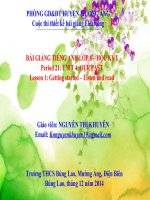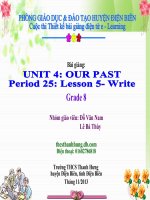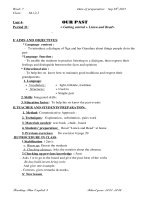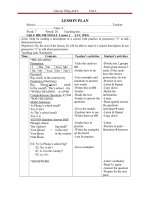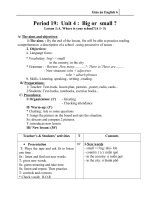Giáo án Tiếng Anh 8 Unit 4: Our past
Bạn đang xem bản rút gọn của tài liệu. Xem và tải ngay bản đầy đủ của tài liệu tại đây (150.68 KB, 17 trang )
GIÁO ÁN TIẾNG ANH 8
Unit 4:
OUR PAST
Lesson 1/20: Getting started + Listen and Read
A. Aim:
By the end of the lesson, students will be able to tell the activities people
used to do in the past.
*. Grammar: Used to + V (bare).
*. Lexical item: equipment , traditional , look after , folk tale.
*. Skill: Listening and speaking.
*. Techniques: Work in pairs.
*. Teaching aids: a picture, posters, tape.
B. Content:
I. Warmer: Getting started
- Ask ss to look at the picture on p. 38 and write the names of the things that do not
belong to the past.
- Let ss discuss with their friends and write.
- Call ss to answer. Correct mistakes.
II. Pre reading:
1. Vocabulary:
- equipment
(n) :
- traditional
(adj) :
- (to) look after
- folk tale
:
(n) :
thiết bị
truyền thống
(translation)
trông nom, chăm sóc
(synonym)
truyện dân gian
(example)
* Checking vocabulary: Rub out and Remember.
2. T/ F statement prediction:
(example)
- Hang on the poster on board.
- Ask ss to read then predict which one is true or false.
II. While reading:
1. Checking ss' predictions
- Ask ss to read the dialogue between Nga and Grandma then check prediction
- Work in pairs then correct the false statements.
* Answer key:
2, 4, 6: T
1, 3, 5: F
2. Comprehension questions:
- Let ss to read the dialogue again then answer the questions on p.39.
- Pairwork.
- Call ss to answer the questions and correct mistakes.
* Questions:
a. Where did Nga’s grandmother use to live?
b. Why didn’t she go to school?
c. What did Nga’s great-grandmother use to do?
d. What did Nga’s great-grandmother and great-father use to do?
e. What did Nga ask her grandmother to do at the end of the conversation?
* Answer key:
a/ She used to live on a farm.
b/ Because she had to stay at home and help her Mom to look after her younger
brothers and sisters.
c/ She used to cook the meals, clean the house and wash the clothes.
d/ Her great-grandma used to lit the lamp and her great-grand father used to tell
stories.
e/ She asked her grandma to tell her the tale “The Lost Shoe”.
3. Fact or opinion:
-Have ss to look at the statements part 3 on p. 39 , read then decide which is a fact
and which is an opinion.
- Give feedback.
* Key:
Fact: a, b, c , d
Opinion: e, f
IV. Post reading:
Did you use to .... ?
- Get up late.
- Ride bicycle too fast
- Eat too much candy
- Forget to do your homework.
* Survey:
- Ask ss some questions to check.
? Who used to get up late/ ride bicycle too fast.....?
- Have ss to ask their friends and write it down the result of their survey.
IV. Homework:
Name
- Learn by heart vocabulary.
- Do exercise in workbook.
- Prepare: Speak.
Unit 4:
OUR PAST
Lesson 2/21: Speak + Language Focus 4
A. Aim:
By the end of the lesson, students will be able to use USED TO to talk about
the things they used to do.
*. Grammar : S + USED TO + V (bare).
S + DID NOT + U.ED TO + V (bare).
DID + S + USED TO + V (bare) ?
*. Skill : Speaking.
*. Skill: Practice in pairs.
*. Teaching aids: a picture, posters.
B. Content:
* Warmer:
* Chatting
- Ask ss the question: "What did you do when you were a child?"
- Get ss to tell the truth.
I. Presentation:
- Ask ss question:
? Why didn’t Nga’s grandma go to school?
Because she used to look after her younger brothers and sisters.
- Let ss look at the sentences, then give the form.
* Form:
(+) S + used to + V(bare).
(-) S + didn’t + use to + V(bare).
(?) Did + S + use to + V(bare)?
Yes, S + did. ? No, S + didn't.
* Use: to express a habit or an action usually happened in the past.
* Meaning: Đã từng/ Đã thường hay làm gì.
II. Practice: Word cue drill:
a. Live/ Hue / Hanoi
c. Get up/ late/ early
b. Have/ long hair/ short hair
d. walk to school/ bicycle
e. study/ evening/ early morning
- Ask ss make questions and answer with word cue using USED TO.
- Model with (a) and have ss repeat.
* Example exchange:
S1: Did you use to live in Hue?
S2: No. I used to live in Hanoi.
- Ask ss to work in pairs.
- Give feedback and correct.
* Answer key:
b. Did you use to have long hair?
No. I used to have short hair.
c. Did you use to get up late?
No. I used to get up early.
d. Did you use to walk to school?
No. I used to go to school by bicycle.
e. Did you use to study in the evening?
No. I used to study in early morning.
III. Production:
1. Speaking:
- Hang on the two pictures on p.40 on the board.
- Let ss to look at them then compare two pictures, using “used to” to talk about
the actions in the past.
- Elicit some ideas so that ss can talk about them.
- Run through activities in two pictures.
? Where did they live in the past? And now?
? How did they travel?
? What’s about the electricity?
? What’s about their life/ work?
? Did children use to go to school?
? What's about their entertainment?
- Ask ss to work in groups of six.
- Give feedback and correct mistakes.
* Answer key:
- In the past:
People used to live in small houses.
People used to walk
People used to work hard all the time.
Most of children used to stay at home.
Children used to play traditional games such as hide and seek, skip rope,.....
- Now:
They live in big houses and buildings
They can go by cars or motorbikes
They have a lot of time for entertainment.
They all go to school.
They have a lot of modern games: video games, …
2. Language Focus 4: (p45)
- Ask s to do exercise 4 on page 45: look at the pictures, complete the dialogue
using USED TO and the verbs in the box.
* Answer key:
1. used to have
2. used to be
3. used to live
IV. Homework:
- Write 5 sentences about the things you used to do last year.
- Do exercises 4, 5, 6 in workbook.
- Prepare: Listen.
Unit 4:
OUR PAST
Lesson 3/22: Listen + Language Focus 2, 3
A. Aim:
By the end of the lesson, students will be able to understand the main idea of a
story by listening and further practice in the simple past tense.
*. Grammar : prepositions of time .
*. Lexical item : Foolist , greedy , gold , lay , amazement , moral .
*. Skill : Listening.
*. Techniques : Practice in pairs and group.
*. Teaching aids: a picture, posters, tape, cassette.
B. Content:
* Warmer:
Gradual picture:
- Devide class into two teams.
- Draw pictures step by step. At the end of each step, ask one team to guess what
the picture is.
- If you don’t guess correctly, continue drawing the next step and let the other team
guess. A point goes to the team that guess first. Draw: eggs, gold, farmer.
I. Pre-listening:
1. Pre teach vocabulary:
- foolish
(adj)
:
ngu ngốc
(situation)
- greedy
(adj) :
tham lam
(example)
- gold
(n)
:
vàng
(visuals)
- (to) lay – laid
:
đẻ (trứng)
(situation)
- amazement (n)
:
sự ngạc nhiên
(trans)
- moral
:
đạo đức
(explan)
(n)
* Checking vocabulary: What and where.
2. Prediction:
* Set the scene: Tell ss they are going to hear a story about a farmer, a kitchen, an
egg and some gold.
- Ask ss guess this story in Vietnamese first (if they know).
- Have ss to look at four titles and guess which is most suitable to the story.
Titles
a. Don’t kill chickens.
b. Don’t be foolish and greedy
c. Be happy with what you have.
d. It’s difficult to find gold.
You guess
You listen
II. While-listening:
1. Listen and check:
- Have ss listen to the tape twice and check their predictions.
- Ask ss to compare with their friends.
* Answer key: The moral lesson of the story:
b. Don't be foolish and greedy.
2. Gap filling:
1. A farmer -------- happily with his family.
2. He had many -----------.
3. The chicken laid a --------- egg.
4. The farmer ---------- it and yelled “We were rich”
5. There were no more eggs of any kind for the -------- farmer.
- Write the sentences on a poster.
- Ask ss to look at them and find the words to fill in the missing gaps.
- Have ss listen again.
* Answer key:
1. lived
4. saw
3. gold
2. chickens
5. foolish
III. Post listening:
1. Mapped dialogue: Language focus 2 - p44
Lan
Nga
I ate noodles.
…lunch?
No. …
How…school?
I … bicycle.
Which subject … ?
math
Where … yesterday evening?
… at home.
* Example exchange:
Lan: Did you eat rice for lunch?
Nga: No. I ate noodles.
Lan: How did you get to school?
Nga: I rode a bicycle to school.
Lan: Which subject did you have yesterday?
Nga: I had math.
Lan: Where were you yesterday?
Nga: I was at home.
2. Brainstorm: Language Focus 3 - p44.
- Ask ss to think and write about "prepositions of time" (eg: in, on, at, after, before,
between…and…, …)
+ in: month, year, season, morning, afternoon.
+ on: day, date.
+ at: time.
- Ask ss to do exercise 3 on p44 using these prepositions.
IV. Homework:
- Learn by heart vocabulary.
- Do exercise 7 in workbook.
Period 23: Correction to the test
A. Aim: By the end of the lesson, Ss will be able to know more about the
knowledge that the teacher tested them in the test I in the first term.
*Teaching aids: Papers.
B. Contents:
I. Gạch dưới từ hoặc cụm từ phù hợp nhất để hoàn thành các câu sau:
1. goes -> the present simple tense to talk about general truths.
2. long black -> The way to describe someone's hair.
3. old enough -> The structure with "enough":
S + Be (not) + adj + enough + to-V + O.
4. am going to visit -> The future tense with "be going to" to talk about intentions.
5. don't have to -> aux. V + not + have to : không phải
6. yourselves -> Reflexive pronoun of "you" (plural).
7. in -> in the right corner of…
8. safe -> the content in the text "Safety precautions in the home".
9. hear -> deaf-mute (n): tật vừa câm vừa điếc.
10. speak -> Can I speak to … ?: someone says when he/ she makes a call.
II. Ghép 1 câu hỏi ở cột A với 1 câu trả lời thích hợp ở cột B:
1 - d: Why - Because
2 - a: Ask and answer about someone's appearance.
3 - e: Ask and answer about someone's characters.
4 - b: Ask and answer about positions of something.
5 - c: Yes/ No questions.
III. Sắp xếp các từ xáo trộn thành câu có nghĩa:
1. He has short curly blond hair.
2. They are looking at themselves in the mirror.
3. You have to keep all dangerous objects out of children's reach.
4. Would you like to leave him a message?
IV. Điền vào mỗi chỗ trống 1 từ phù hợp cho trong bảng sau:
1. is
4. have
7. cooks
2. received
5. for
8. best
3. letter
6. fried
9. myself
10. on
C. Homework:
- Prepare for new lesson: Unit 4 - Read.
Unit 4:
OUR PAST
Lesson 4/24:
Read
A. Aim: By the end of the lesson, students will be able to understand the details
and retell the story “The Lost Shoe”.
Teaching aids: posters.
Anticipated problems:
B. Content:
I. Warmer: Brainstorming:
Tam Cam
Frog Prince
- Ask ss question:
? Name some folk ale that you have read?
? Do you know the story of Tam Cam?
The folk tale
? Can you tell me the story in Vietnamese?
- Ask ss to tell a little bit of the Tam Cam
Story in Vietnamese.
Snow White and 7 dwarfs
One hundred-section bamboo
II. Pre-reading:
1. Vocabulary:
- cruel (adj):
độc ác, ác nghiệt
(situation)
- upset (adj):
buồn phiền, thất vọng
(synonym)
- magically (adv):
kì diệu
(translation)
- immediately (adv):
ngay lập tức
- rag (n):
quần án rách, vải vụn
(visuals)
- prince (n):
hoàng tử
(example)
(traslation)
* Checking vocabulary: Slap the board.
2. Grid:
Person in story
Cruel
Greedy
Hardworking
Generous
Little Pea
Stout Nut’s
√
√
√
mother
Fairy
Stout Nut
√
- Hang on the table on board.
√
- Ask ss to look at the table and ask question:
? Is Little Pea hard-working? - Yes
- Ss use their knowledge of the story and answer “Yes” – put a tick (√) in the box.
- Ask ss to copy the table, discuss with their friends to complete the box.
III. While-reading:
1. Checking ss' predictions:
- Let ss read the story on p. 41 to check.
* Answer key: (on the table).
2. Gap filling:
- Ask ss to read the story again and do exercise 1: complete the sentences with
words from the story.
* Answer key:
a. farmer
d. marry/ choose
b. died
e. new clothes
c. used - again
f. lost
2. Comprehension questions:
- Ask ss to read the story again and then answer the questions on p.42.
- Work in pairs.
- Call 6 pairs to ask and answer.
- Give feedback. Check and correct mistakes.
* Questions:
1. Who was Little Pea?
2. What did Stout Nut’s mother make Little Pea do all day?
3. How did Little Pea get her new clothes?
4. Who did the prince decide to marry?
5. Is this a true story? How do you know?
* Answer key:
1. She was a poor farmer’s daughter.
2. She made her do the chores all day.
3. Before the festival started, a fairy appeared and magically changed her rags into
beautiful clothes.
4. He decided to marry Little Pea because the shoe fitted her.
5. Ss' answers.
IV. Post-reading: Finger feedback - T/F:
- Teacher reads the statements.
- Ss listen to them and decide if they are true or false. If true, all ss hold up two
fingers. If false, they hold up fist.
- Ss answer silently, only with their fingers.
- T repeats the statements many times so ss practice listening.
1. Little Pea had to do a lot of housework.
2. Little Pea’s father died of a broken heart.
3. Stout Nut’s mother made new clothes for Little Pea.
4. A fairy appeared and changed Little Pea’s rags into beautiful clothes.
5. Little Pea lost her hat.
6. The fairy found Little Pea’s shoe.
* Answer key:
1, 2, 4: T
3, 5, 6: F
V. Homework:
- Learn by heart vocabulary. Retell the story.
- Do exercise 3 in workbook.
- Prepare for Write.
Unit 4:
OUR PAST
Lesson 5/25:
Write
A. Aim: By the end of the lesson, students will be able to use simple past tense to
write a story, introduce some new words and evaluate whether they are correct,
review to classroom skill of peer checking and correcting.
Teaching aids: posters.
Anticipated problems:
B. Content:
I. Warmer: Drawing
- Draw a picture of a farmer on the board.
- Get ss to guess what it is. Either continue drawing or get a ss to draw a buffalo
and then a tiger. Ask ss question:
? Have you ever read the story “How the tiger got his stripes”?
II. Pre-writing:
1. Vocabulary:
- wisdom (n):
trí khôn, trí tuệ
(situation)
- stripe (n):
sọc vằn.
(realia)
- straw (n):
rơm
(realia)
- escape (v):
- graze (v)
- servant (n):
trốn thoát
gặm cỏ
đầy tớ
(traslation)
(visuals)
(example)
- tie (v):
trói buộc
(mime)
* Checking vocabulary: What and where.
2. Gap filling: "How the tiger got his stripes".
- Have ss complete the story using the verbs in the box.
- Check that they uderstand the meaning of the verbs.
- Give ss 5 minutes to put as many verbs in the blank as they can. (Ex.1-p.43)
- Call ss to answer. Check and correct mistakes.
* Answer key:
1. appear
4. left
7. lit
2. as
5. went
8. burned
3. said
6. tied
9. escaped
III. While-writing:
- Tell ss to imagine they are the farmer to write the story.
- Ask them take a dictation from the word prompts. Dictate the first 2 sentences.
1. One day, I was in my field.
2. My buffalo was grazing when a tiger came.
- Tell ss to continue writing their story and elicit how to change the pronouns: He
-> I; His -> my; him -> me.
- Give ss 10 minutes to write individually and then ask them to share with their
partners.
- Tell them to underline all the verbs in their partner’s paper.
- Ask them how many they found. Tell them to check if the verbs are in simple
past.
* Answer key:
One day, as I was in the field and my buffalo grazed nearby, a tiger came. It asked
why the strong buffalo was my servant and I was its master. I told the tiger that i
had something called wisdom. The tiger wanted to see it but I said that I left the
wisdom at home that day. Then I tied the tiger to a tree with a rope because I didn’t
want it to eat my buffalo. I went to get some straw and I burned the tiger. The tiger
escaped, but today it still has black stripes from the burns.
IV. Post-writing:
- Call ss to the board to write one sentence of the story up. (each student write one
sentence).
- Call others to underline the verbs.
- Check the verbs first and then clap for the story when all the verbs are correct.
- Ss control correction.
V. Homework:
- Learn by heart vocabulary.
- Rewite the story in notebook.
- Do exercise 4 in workbook.
- Prepare for Language focus.

